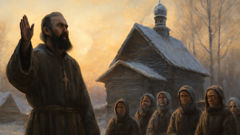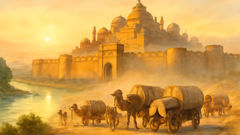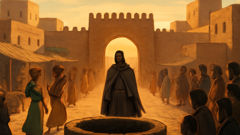Introduction
Dawn breaks gently over the rolling fields outside Moscow, the land wrapped in the soft hush of early spring. Here, estates sprawl like islands of wealth, each manor’s pale façade catching the golden light as if in silent competition. Stately birches line winding drives, their pale trunks standing in contrast to the dark earth beneath them. Life in these grand houses is measured by the rhythm of social calls, letters exchanged by candlelight, and the distant rumble of news from the front. But 1805 is not like other years. The air is restless, and beneath the clatter of silver spoons and laughter in drawing rooms, fear hovers like an unwelcome guest. Rumors of Napoleon’s bold advances have crept northward, their echo felt even in the heart of Russia’s nobility. In salons and ballrooms, conversations veer between hope and dread, while the old order—so carefully preserved—teeters under the weight of coming storms. At the center of this world are five families, bound by alliances, rivalries, and secrets. Their sons ride off to war, their daughters dream of love or freedom, and their elders cling to traditions threatened by a continent in upheaval. As the spring thaws into summer, choices made behind gilded doors will reverberate far beyond Russia’s borders, shaping destinies as unyielding as the land itself. Within these walls, personal ambitions and private heartbreaks become inseparable from the grand march of history. And so, amid laughter and tears, courage and betrayal, the fate of a nation unfolds in the lives of its people—noble and humble, flawed and heroic—each seeking their place in a world forever changed.
I. The Gathering Storm
The first hints of trouble reach the Karamzin estate as a letter—a simple sheet of vellum sealed in wax—arrives from St. Petersburg. Count Dmitri Karamzin stands by the window of his study, reading the words with a frown that deepens with every line. Outside, his son, Alexei, leads a young stallion through the morning mist, blissfully unaware that the world he knows is about to be upended. The missive is clear: Napoleon’s armies have crossed the border, and Russia must mobilize. Orders for conscription flutter through the provinces like autumn leaves, landing heavily in households long shielded from hardship. For families like the Karamzins, the Vorontsovs, the Petroviches, the Orlovs, and the enigmatic Chernovs, such news isn’t just political. It’s personal. Sons are called to arms, daughters’ prospects shift with every new campaign, and alliances—once a matter of polite conversation—take on a sharpened edge.
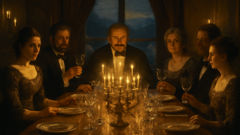
In the Karamzin household, the announcement of Alexei’s departure to join the cavalry is met with a mixture of pride and dread. His mother, Countess Irina, tries to mask her fear behind firm words and a trembling smile. She hosts a farewell supper, where laughter rings hollow and wine flows a little too freely. Alexei’s younger sister, Katya, steals away to the orchard, clutching a letter she’s never had the courage to send to Pavel Vorontsov, her childhood friend and secret confidant. That same evening, at the Vorontsov estate, General Sergei Vorontsov prepares his own son for war. Pavel stands at attention, his jaw clenched, listening to his father recount tales of courage and honor from campaigns long past. Yet Pavel’s thoughts drift to Katya Karamzin, and to the unspoken promise that lingers between them. In the shadowed corners of the drawing room, Lady Yelena Vorontsova laments the state of Europe while planning the season’s social calendar with meticulous precision—her way of fighting uncertainty with order. The Petrovich family faces a different struggle. Nikolai Petrovich, a scholar more comfortable among books than soldiers, is torn between duty to country and a longing to remain with his new wife, Sofia. Sofia, for her part, is quietly determined that her husband will survive this war, even if she must challenge the conventions of her class to ensure it. Meanwhile, rumors swirl around the Chernovs, whose patriarch, Grigory Chernov, is known for his shrewd investments and secretive dealings. Some whisper that he profits from the war, trading in grain and horses, while his daughter, Anya, moves through society with an enigmatic grace that draws admiration and suspicion in equal measure. As the estates prepare their sons and say tearful goodbyes, the wider world intrudes in ways that cannot be ignored. Peasant conscripts march past manor gates. News of victories and defeats arrives with every passing courier. At night, candles burn late in libraries and nurseries, illuminating faces lined with worry and hope. The spring of 1805 turns to summer, and the Russian countryside—once a haven of peace—bristles with the tension of what’s to come.
II. Hearts in Exile
Autumn’s chill settles over Russia as the first reports from the front arrive, carried by weary messengers whose uniforms are caked with mud. The mood among the aristocracy shifts from anxious anticipation to grim endurance. Letters become lifelines. Each week, Countess Irina waits at the manor’s gates, watching for the post rider who might bring news—good or ill—of Alexei. His notes, when they come, are brief but brimming with the bravado he thinks his family expects. Yet between the lines, Irina senses the shadow of battle: tales of muddy encampments, sleepless nights, and the cold comfort of camaraderie among young men facing death together. At the Vorontsov estate, Lady Yelena’s salons lose some of their sparkle. Guests whisper in corners about troop movements and shortages. Pavel writes less often, his words growing clipped and formal. Katya feels his distance keenly. She turns to her piano, letting music voice what she cannot say, while her mother chides her for spending too much time in melancholic reverie. In Moscow, Sofia Petrovich finds herself at odds with her own expectations. With Nikolai away, she manages the estate’s affairs, negotiates with merchants, and even oversees the harvest. The staff learn to trust her steady hand. Despite her outward composure, Sofia’s nights are restless. She paces the grand corridor, one hand pressed to her belly, hoping that Nikolai will return before their first child is born. War blurs old boundaries. At a charity ball to raise funds for wounded soldiers, Anya Chernov and Katya Karamzin cross paths. Anya’s wit and intelligence draw Katya out of her shell; soon the two become confidantes, their friendship blooming in a garden of uncertainty. They speak openly about their fears and hopes, their love for absent brothers or secret sweethearts. Meanwhile, Grigory Chernov’s shadow lengthens across the city. His fortune grows even as others’ fortunes wane, and his loyalty to the Tsar is quietly questioned. Yet, as winter descends, it’s clear that even the well-connected cannot shield themselves from grief. The first real blow falls on the Vorontsovs: news arrives that Pavel has been wounded at Austerlitz. The letter is terse—he lives, but the cost has not yet been counted. Lady Yelena’s world contracts to a sickroom, where she tends her son with fierce devotion. Katya, desperate for word, writes letters she never sends and watches the snow pile against her windowpanes. The city grows quiet under winter’s weight. Fires crackle in drawing rooms where laughter is rare. Every family has lost something—a son, a husband, a sense of security. Yet in these darkest months, bonds strengthen. The Karamzins open their home to convalescent officers. Sofia arranges for peasant women to knit scarves for the troops. Anya Chernov organizes clandestine gatherings where women share news and comfort. In exile from peace and certainty, the heart adapts. Love persists—sometimes quietly, sometimes defiantly—against a backdrop of absence and fear.
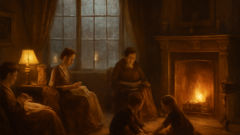
III. The Fires of Fate
Spring comes reluctantly to Russia in 1807, the thaw revealing both hope and hardship. On battered roads, soldiers limp home—some for good, others only until the next call to arms. The Karamzin estate hosts a gathering to celebrate Alexei’s brief return. He arrives gaunt but unbroken, his eyes older than his years. Irina weeps as she embraces her son, and even the staff pause their work to watch the reunion. Alexei’s return is bittersweet. He brings stories of valor and loss: comrades left behind, villages razed, moments when death seemed certain but was mercifully postponed. At night, he sits with his father, discussing the future of Russia and the price of honor. Yet the world he returns to is not unchanged. Katya is more reserved now, her laughter guarded. She confides in Anya Chernov about her fears for Pavel—still recovering from his wounds and distant, both in spirit and in letter. Anya herself faces a crossroads. Her father’s business dealings have drawn unwanted scrutiny. She must choose whether to defend him publicly, risking her own reputation, or quietly distance herself to preserve her standing among Moscow’s elite. An unexpected visitor alters the course of several lives: Nikolai Petrovich returns home on leave to discover Sofia heavily pregnant and transformed by responsibility. They share a night of honest conversation—confessing fears and longing, forging a deeper bond that neither had anticipated when they married. Nikolai promises to return from the war, and Sofia clings to his words like a lifeline. Meanwhile, unrest spreads through the countryside. Peasant uprisings rumble at the edges of noble estates as food grows scarce and taxes climb. Grigory Chernov’s fortune is tested by both market instability and rumors of betrayal. At a tense dinner party attended by all five families, secrets come to light: alliances are questioned, old grievances surface, and new affections are revealed. Katya and Pavel, reunited at last, find themselves at a crossroads—torn between duty to family and the promise of happiness together. The evening ends in tears and angry words, but also in an unspoken recognition that change is inevitable. As Napoleon’s armies draw nearer once more, every decision is colored by the uncertainty of survival. Fires burn not only on distant battlefields but in hearts determined to shape their own destinies. Each family faces choices that will ripple through generations—choices about love, loyalty, sacrifice, and what it truly means to endure.
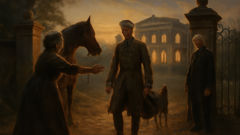
Conclusion
By 1812, with Moscow itself threatened by Napoleon’s march, the fortunes of these families are intertwined with the fate of their nation. The old world is swept away by fire and retreat. Noble estates are abandoned; treasures hidden or lost. The Karamzins join the exodus from Moscow, leaving behind memories and mementos in their haste. Alexei returns to the front, steeled by all he has seen and suffered. Katya and Pavel, reunited by adversity, find strength in each other. Their love is no longer a private dream but a reason to endure. Sofia gives birth to a healthy daughter in a crowded country inn far from home, her courage an anchor for Nikolai and others displaced by war. The Petrovich family, once bound by tradition, now finds new purpose in helping rebuild what has been destroyed. Anya Chernov faces her father’s disgrace with quiet dignity, choosing honesty over convenience. Her example inspires others to question what truly matters: wealth or character, privilege or compassion. As winter descends again and Napoleon’s armies falter in the unforgiving Russian snow, the survivors gather in humble circumstances. Gone are the glittering balls and endless banquets; in their place are stories shared by firelight, hands clasped in solidarity. The war has changed everything—and everyone—but not all is lost. In their resilience, in their ability to find hope amid ruin, these families embody the soul of a nation. Their struggles and triumphs become part of Russia’s memory, echoing down the years. Through perseverance and love, they endure—reminding us that even in history’s darkest moments, the human spirit burns bright.



